#latvia-russia border
Explore tagged Tumblr posts
Text
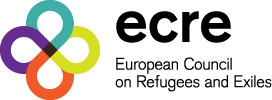
#european union eastern border#estonia#estonian border guards#latvia#latvia-russia border#finland#pushbacks#lithuania#poland
0 notes
Text
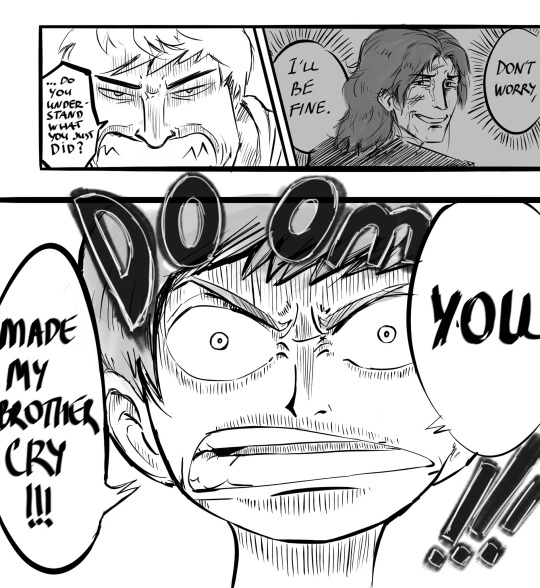
Happy State Restoration Day, Lithuania
#redraw from one piece#i kindly ask you guys to not write haaa cringe pls#hetalia#hws lithuania#hws latvia#hws russia#aph lithuania#aph latvia#inspired by how latvians amd estonians made a human chain on lithuanian border
8 notes
·
View notes
Text
People be like "but russia is not an empire!!" but can't answer how come then it borders both Latvia and North Korea
#look at the size of that thing#do you think people from all over that territory just decided to be one country?#russian imperialism
159 notes
·
View notes
Text
What is a Russian Character and How to write them
As @sarapaprikas-blog and I were working on this post, we noticed a gap of knowledge and public perception that we want to address. Plenty of characters get labelled as Russian in media without necessarily being Russian. On the other hand the Archetypal ”Russian” character often does not mirror the realities of being Russian. We are to talk about that.
What is Russia?
Russia is a country. It is the largest country in the world with over 140 million inhabitants, stretching over 11 time zones. It is often seen as the successor state to the Soviet Union, which in itself was the successor state of the Russian Empire. The Soviet Union and Russia do not have the same borders or government. However, modern Russia draws a lot from its history as the largest and dominant part of the Soviet Union. Before the Soviet Union, the area was governed by the Russian Empire. The Russian Empire, as the name already indicates, was imperialist. The history as an Empire with massive expansion, colonies and conquering different people, is arguably the biggest reason why modern Russia is as big as it is today.
What is Russian?
There is a difference between the language Russian, the ethnicity Russian, and the nationality Russian. In English the difference can be made out only by context.
Who is Russian?
As aforementioned, there is a difference between Russian (Россиянин) meaning citizen of Russia, and ethnically Russian (Русские). The term Russian (Русские) usually refers to ethnicity, indicating a person who has Russian roots. Russian (Россиянин) implies Russian citizenship, regardless of ethnicity. Thus, a Russian can be someone with Russian citizenship, but not all Russian citizens are Russians in the ethnic sense. Also, not all ethnic Russians have Russian citizenship or live within Russia.
Ethnic-Russians are an East Slavic people. Obviously, they mainly live in Russia. But there are also large communities in Ukraine, Kazakhstan, Belarus, Latvia, Lithuania, and other countries. The traditional religion among Russians is Orthodox Christianity. The main language is Russian.
The country Russia is home to more than 190 ethnicities, including indigenous and autochthonous people, leading to a variety of languages, religions and practiced cultures. So, someone who holds a Russian citizenship, has ethnic Russian heritage and / or speaks Russian, can look very different than the cliche Russian bond girl or evil-doer indicates. That also means that those who get labelled Russian can live very different lives. Writing a Russian character gives you a lot of room outside of the prevalent stereotyped depictions.
Who is not Russian?
Simple - those who say they are not Russian, are not Russian.
Who are Slavs? What is Slavic?
The slavic people are a variety of people, ethnically Russian people are part of that group. However, there are a lot of other ethnic groups that are Slavs without being Russian e.g. Poles, Sorbs, Czech, Ukrainians, and many more. Slavic is the corresponding adjective to Slavs. It is often used to describe the indo-Slavic language group. Slavic is also often used to describe the collectively perceived similarities of Slavic peoples' culture. However, that can be misleading and get’s often orientalised as not everything from Eastern-Europe or Russia is slavic.
Russian vocabulary Да - Yes Нет - No Привет - Hi Здравствуйте - Hello Как дела ? - How are you? Хорошо - Good Пожалуйста - Please Не за что - my pleasure До свидания - Goodbye Пока - bye Увидимся - See you later Хорошего дня - Have a nice day Простите - I'm sorry. (Plural or honoured addressee) Помогите, пожалуйста. - Help me please. (Plural or honoured addressee) Доброе утро - Good morning Доброй ночи - Good night. Добрый день - Good day / afternoon.
Pet names in Russian About pet names. They are either masculine of feminine . Please don't use words like darling, kitten, baby, pretty, sweetie, little one, little fox, etc. as they sound really strange in translation to native speakers. Pet names are common for close ones (family, close friends, spouses). Sometimes primary school teachers call students by affectionate names. Also sweet old lady may call you ( Дорогой/ Дорогая). But outside of that nobody calls each other by pet names, only using names because Russians are very reserved and private people in general. Gender neutral pet names: жизнь моя - my life солнце мое - my sun or my sunshine ты мое все - you my everything. лучик - sunray. мое сокровище - my treasure. мое золотце - my gold or sweetheart. моя любовь - my love. ты моя радость - you are my joy. ангелочек - Angel. прелесть моя - my precious.
Queerness and gender-neutral speech in Russian Being queer in Russia is hard as queers face oppression. Because of that, there is limited to no public discourse on how to adapt and diversify the language to include queer and especially non-binary identities. This is a problem as the Russian language is extremely gendered and expresses a gender binary in near default. While gender neutral pronouns in Russian exist, it's harder to use them in real life as the neutral pronoun “оно” is mostly associated with things or animals and not living humans, similar to the English “it”. Often words generally do not have gender neutral alternatives. However, one way we suggest for a more gender neutral speech is to avoid most explicit gendering as the flexible syntax in combination with using plural pronouns in Russian allow for more gender neutral speech. For Example: Я люблю их всем моих сердцем - I love them with all my heart. Расс��ажи мне о них! - Tell me about them. Дай им время- give them time. Я горжусь ими - I'm proud of them. Они сделает это сами - they do it themselves. Read more about queerness in Russia here: one two three four
Russian swearing In Russia, swearing is considered a sign of rudeness and poor manners. Use accordingly. Also, as mentioned here, Russian syntax and inflection are different from English. Meaning one word can be a whole sentence. We punctuated every swearing that is technically a whole sentence and therefore can stand on its own grammatically. Блять - fuck Пошел нахуй. - fuck you Хуй - dick Пизда - cunt Мы в пизде. - we are fucked / “We are stuck in the cunt.” Ебать - fuck Ахуел. - are you/they crazy?! Это пиздец. - this fucked up Мудак - asshole Завали ебало. - shut the fuck up Сука - bitch Черт - damn Непизди. - stop fucking lying. / Cut your bullshit. Пиздобол - Person who lies a lot/ Don't lie Мамку твою ебал. - i fucked your mom (mostly used by middle schoolers, here in grammatically masculine gender.) Заебись. - holy shit (could be bad or good depend on situation) Похуй! - I don't fucking care. Навешать пиздюлей - to beat up someone. Срать тебе в рот - To crap in your mouth. Ты ебанулся. - Are you batshit crazy. Заебал. - I'm sick of you. Жопа - ass. Иди в баню. - soft version of Иди нахуй.
Explanation of the Russian Naming System & Patronyms
The Russian naming system consists of three main elements: first name, patronymic and last name. Name: This is the first name given to a child at birth. In Russia, the names are chosen by the parents or relatives of the child. Names can be both traditional (Alexander, Anna, Ekaterina) and modern (Sofia, Victoria, Yaroslav). Patronymic: this is the second name, which reflects the child's origin from his father. Some cultures in Russia also use the mothers name. The patronymic name among Russian people arose in the 10th - 11th centuries and was used infrequently at first, but became widespread around the 16th century. It is formed by adding the suffix "-ovich" or "-aries" to the father's name. For example, if the father's name is Ivan, then his child Ivan or Ivanna will be called Ivan Ivanovich or Ivanna Ivanovna. Last name: This is a family surname that is passed down from generation to generation. It is usually assigned at birth and does not change without special circumstances. Surnames can come from various sources, such as profession, place of residence, origin, or personal characteristics. As a result, a person's full name consists of a first name, a patronymic (if applicable) and a last name, for example: Ivan Ivanovich Petrov.
How to respectfully address a person in Russian. In Russian there are two ways to address someone. Using the polite you (Вы) amd using the formal you (Ты). The choice of mode depends on how well you know the other person and whether you are superior or inferior in terms of age and social position. If you know the person's first name you refer to them by first name and patronymic. For examples: Борис Юрьевич, Ваши рабочие отлично справились с ремонтом- Boris Yurievich, your workers did a great job with repairs. Adults never address a person by name, only by surname or patronymic unless the addressee gives permission to address them in an informal manner. Regulations of most military require their members address each other in formal you( Вы ); subordinates address commanders as товарищ (comrade) + rank , while higher ups address subordinates by military rank and surname. Example: [Colonel to Sgt. Sidorov] Сержант Сидоров, ко мне! Sergeant Sidorov, front and center! [sgt. Sidorov to colonel] По вашему приказанию прибыл, товарищ полковник! Reporting for duty [lit. arrived at your (pl.) request], comrade colonel! Military men sometimes use same forms of address, albeit in singular, in friendly conversation. Example: Сержант, дай сигарету. - Give (sing.) me a cigarette, Sarge. Military hierarchy in Russia You can find useful links here. One Two
#könig#sarapaprikasblog#nikto#call of duty 3#call of duty modern warfare 3#creative writing#nik cod#nikolai belinski#cod#cod modern warfare#gromsko#call of duty#gromsko cod#sobiesław kościuszko#grimmwriting#sebastian krueger
345 notes
·
View notes
Text
hi. I never post lol I don't think I've posted here for literal years but I do lurk and I just need to get something off my chest.
Kallus isn't Space-Russian. Controversial I know, but he's not.
He's Estonian.
Kallas is already a Slavic name you don't have to strip his character of the cultural identity he already has to insert a different culture. It's weird to me how this whole fandom, usually one that's very respectful, just kind of dismissed his name as something stupid or cartoonishly evil without even a cursory search before hand waving it away.
Estonia is a Slavic-Nordic country bordering Russia, Latvia, and Finnish waters. He has a cultural identity and people just... ignore it?? He wouldn't speak Russian, he'd speak Estonian (which doesn't use the Cyrillic alphabet).
Slavic =/= Russian. Russians are Slavs, but not all Slavs are Russian. Estonians don't use Russian patronymics ( i.e. Dmitryevich), his family wouldn't have Russian names (Nickolai, Anastasia, Yvgenia, etc.), they'd have Estonian names (Aarne, Jakob, Indrek, Tatijana, Kaja, etc).
I just. I don't feel comfy when people change his name from Kallus to something like Kalinov because Kallus is already Slavic you don't have to do that.
Stop changing a cultural name from a post-Soviet country to something more Russian. Maybe I'm just a killjoy and a bitch but it actually pisses me off.
"omg!1! he's space-Russian11!!" I'm scrolling already. Estonians are real. Kallas is a real name. Please stop.
#agent kallus#alexsandr kallus#rebel kallus#star wars rebels#star wars kallus#kalluzeb#kallus x zeb#kallus#character with an estonian name: hi :)#everyone for some reason: privyet#couldve made him ukranian or hungarian or polish or latvian or#bothered me for years now but for some reason today was my limit#idk why#anyway#back into the ether for me lol
43 notes
·
View notes
Text
Imagine that someone—perhaps a man from Florida, or maybe even a governor of Florida—criticized American support for Ukraine. Imagine that this person dismissed the war between Russia and Ukraine as a purely local matter, of no broader significance. Imagine that this person even told a far-right television personality that “while the U.S. has many vital national interests ... becoming further entangled in a territorial dispute between Ukraine and Russia is not one of them.” How would a Ukrainian respond? More to the point, how would the leader of Ukraine respond?
As it happens, an opportunity to ask that hypothetical question recently availed itself. The chair of the board of directors of The Atlantic, Laurene Powell Jobs; The Atlantic’s editor in chief, Jeffrey Goldberg; and I interviewed President Volodymyr Zelensky several days ago in the presidential palace in Kyiv. In the course of an hour-long conversation, Goldberg asked Zelensky what he would say to someone, perhaps a governor of Florida, who wonders why Americans should help Ukraine.
Zelensky, answering in English, told us that he would respond pragmatically. He didn’t want to appeal to the hearts of Americans, in other words, but to their heads. Were Americans to cut off Ukraine from ammunition and weapons, after all, there would be clear consequences in the real world, first for Ukraine’s neighbors but then for others:
If we will not have enough weapons, that means we will be weak. If we will be weak, they will occupy us. If they occupy us, they will be on the borders of Moldova and they will occupy Moldova. When they have occupied Moldova, they will [travel through] Belarus and they will occupy Latvia, Lithuania, and Estonia. That’s three Baltic countries which are members of NATO. They will occupy them. Of course, [the Balts] are brave people, and they will fight. But they are small. And they don’t have nuclear weapons. So they will be attacked by Russians because that is the policy of Russia, to take back all the countries which have been previously part of the Soviet Union.
And after that, if there were still no further response? Then, he explained, the struggle would continue:
When they will occupy NATO countries, and also be on the borders of Poland and maybe fight with Poland, the question is: Will you send all your soldiers with weapons, all your pilots, all your ships? Will you send tanks and armored vehicles with your young people? Will you do it? Because if you will not do it, you will have no NATO.
At that point, he said, Americans will face a different choice: not politicians deciding whether “to give weapons or not to give weapons” to Ukrainians, but instead, “fathers and mothers” deciding whether to send their children to fight to keep a large part of the planet, filled with America’s allies and most important trading partners, from Russian occupation.
But there would be other consequences too. One of the most horrifying weapons that Russia has used against Ukraine is the Iranian-manufactured Shahed drone, which has no purpose other than to kill civilians. After these drones are used to subdue Ukraine, Zelensky asked, how long would it be before they are used against Israel? If Russia can attack a smaller neighbor with impunity, regimes such as Iran’s are sure to take note. So then the question arises again: “When they will try to occupy Israel, will the United States help Israel? That is the question. Very pragmatic.”
Finally, Zelensky posed a third question. During the war, Ukraine has been attacked by rockets, cruise missiles, ballistic missiles—“not hundreds, but thousands”:
So what will you do when Russia will use rockets to attack your allies, to [attack] civilian people? And what will you do when Russia, after that, if they do not see [opposition] from big countries like the United States? What will you do if they will use rockets on your territory?
And this was his answer: Help us fight them here, help us defeat them here, and you won’t have to fight them anywhere else. Help us preserve some kind of open, normal society, using our soldiers and not your soldiers. That will help you preserve your open, normal society, and that of others too. Help Ukraine fight Russia now so that no one else has to fight Russia later, and so that harder and more painful choices don’t have to be made down the line.
“It’s about nature. It’s about life,” he said. “That’s it.”
#current events#warfare#politics#russian politics#american politics#russo-ukrainian war#2022 russian invasion of ukraine#russia#ukraine#usa#volodymyr zelenskyy#ron desantis#nato
245 notes
·
View notes
Text
In the early hours of Sunday, Sept. 8, a Russian drone flew into Romanian airspace during a nighttime attack on Ukraine’s Danube River ports. Romania scrambled two F-16s to monitor the situation, according to the Romanian Defense Ministry. A day earlier, an Iranian-type Shahed drone armed with explosives flew from Belarus into Latvia—which is neither close to Ukraine nor on a direct flight path—and crashed near the Latvian city of Rezekne, about 35 miles from the closest section of the Belarusian border. Throughout the war, by accident or design, Russian missiles and attack drones have repeatedly infringed the airspace of Romania, Latvia, Poland, and other NATO members —and hit the alliance’s territory.
In late August, Kyiv asked European Union and NATO ministers to start shooting down Russian missiles and drones heading toward NATO over Ukraine. At first glance, this might seem like a request for NATO to step into the firing line and become a party to the war. For the Biden administration and some allied governments, becoming a direct participant in the war against Russia has been the darkest of red lines from the moment that Western intelligence services noticed Moscow’s preparations for invading Ukraine.
Establishing an air defense shield to protect NATO’s own eastern flank, however, does not translate to NATO’s entry into the war. The escalatory risk of NATO protecting its own territory can be controlled—even while a shield to head off Russian missiles and drones would have the secondary effect of providing parts of western Ukraine with much-needed air cover. Ultimately, a firm decision by NATO to act against repeated breaches of its airspace is likely to be de-escalatory. That’s because the real risk lies in letting Russia continue to test Western decision-making—and for the Kremlin to believe that it will meet no resistance when it escalates.
Ground-based air defense from various NATO member states—including Britain, France, the Nordic countries, the Netherlands, the Czech Republic, and other willing allies—could be deployed on the territory of Poland, Slovakia, and Romania at strategic locations along their borders with Ukraine. Allied aircraft operating in NATO airspace could also be used. The bloc would operate the shield entirely from allied territory and airspace, no weapons or troops would be placed inside Ukraine, and NATO aircraft would not enter Ukrainian airspace. The primary purpose of the air defense shield would be to prevent Russian attack drones and missiles from entering NATO airspace and hitting objects on the alliance’s territory.
Such an operation could be carried out on a bilateral basis or by a coalition of the willing. And it would not be a NATO-wide operation, given that Hungary would likely block any action by the alliance.
There have been regular instances of Russia breaching NATO airspace since the start of the invasion. Some of these incursions may well be accidental. In the first weeks of the invasion, a drone carrying explosives flew unhindered through Romanian and Hungarian airspace until it crashed next to a student dormitory in the outskirts of the Croatian capital Zagreb. In November 2022, a S-300 air-defense missile, possibly fired from Ukraine at a Russian target, went astray and killed two farmers in Poland.
But other instances do not seem so accidental. In March, a Russian missile—whose target and flight path were preprogrammed—spent 39 seconds traveling through Polish airspace before reentering Ukraine. Especially in light of deliberate Russian incursions in the Baltic Sea region and elsewhere, some of these incidents seem to be part of a systematic attempt by Russia to test NATO’s resolve and decision-making process.
This probing is dangerous and comes with a high risk of escalation. Not only could it lead to a Russian drone or missile hitting NATO territory and potentially killing civilians, but NATO would also then have to decide whether to respond to such an attack—including whether to invoke Article 5, the collective defense clause that requires the alliance to defend its members. The more that Russia probes without any NATO response, the greater the risk of an incident that would trigger Article 5.
An air defense shield to protect NATO would be a clear response to that Russian probing, with the welcome secondary effect of helping Ukraine. It would signal a more serious posture by Ukraine’s supporters and show that they are willing to regain the strategic initiative rather than merely reacting to events and drawing no red lines for Russia.
For Ukraine, the shield could help provide a degree of security along a corridor running along its western border, where drones and missiles would be engaged by the shield lest they cross into NATO territory. The depth of this corridor would depend on the types and number of air defense assets deployed. It would reduce or eliminate attacks on Ukrainian cities and critical infrastructure close to the border, such as the Danube ports and various electricity substations, transmission lines, and gas storage facilities.
It would also mean greater security for Ukrainian businesses and factories operating within the corridor, as well as a degree of humanitarian protection for civilians and civilian infrastructure, such as hospitals. Parts of Moldova, which is not in NATO, would fall within the corridor as well. The shield would not provide perfect protection everywhere, but it would certainly contribute more than what exists today.
A NATO air defense shield along the alliance’s eastern flank would also enable Ukraine to move some of its air defense systems from its western border closer to the front and the cities in the east, such as Dnipro and Poltava. This would strengthen Ukrainian air defense without additional systems leaving the armories of its Western allies.
The main objection to the air defense shield has been that it would prove to be escalatory by drawing NATO into direct confrontation with Russia. By shooting down Russian drones and missiles flying over Ukraine, the argument goes, NATO would become a party to the conflict and invite military retaliation by Russia, setting off a cataclysmic Russia-NATO war.
The opposite, however, is more likely to be true.
First, enforcing an air defense shield would not mean shooting down Russian fighter jets and killing Russian pilots. Russia does not fly crewed aircraft in western Ukraine precisely because of the high risk of Ukrainians shooting them down. Hence, the shield would only target uncrewed drones and missiles. For all its huffing and puffing, Moscow would be hard-pressed to make a credible case for retaliation against a country exercising its right of self-defense to shoot down a missile entering its airspace or heading in its direction.
Indeed, one could make a compelling case that NATO border states have an obligation to protect their citizens. Polish Foreign Minister Radoslaw Sikorski has stated that his and other countries have a duty to intercept Russian missiles before they enter NATO territory.
Second, an air defense shield would aim to prevent Russian missiles and drones from striking inside the territory of a NATO ally, which could trigger the Article 5 mutual defense clause. In this sense, the shield would actually be de-escalatory in averting a possible Article 5-level crisis that could quickly spiral out of control. Russia’s ability to routinely breach NATO airspace without a reaction weakens the bloc’s deterrence and raises the likelihood that Russia will probe and provoke further.
Ukraine’s partners, most notably the United States and Germany, have imposed strict caveats on Ukraine’s use of Western weapons—even including those delivered by Britain or other Western partners—and shown considerable restraint in their support for Ukraine. In their view, this cautious approach prevents escalation. But the effect has been the opposite: Not standing firm and pushing back has been an invitation for Russia to prod, provoke, and raise the stakes. Paradoxically, restraint comes with a high risk of escalation.
In showing that it will continue to push against the West if unobstructed, the Kremlin is staying true to Soviet leader Vladimir Lenin’s famous strategic adage: “You probe with bayonets: If you find mush, you push. If you find steel, you withdraw.” An air defense shield on NATO’s eastern border could provide that steel.
Would Russia retaliate against a NATO ally for intercepting a drone or missile that might strike its territory? This is highly unlikely. Russian President Vladimir Putin has repeatedly shown that he takes Article 5 seriously, and a retaliatory strike against a NATO ally could draw in the entire alliance. He will not risk wider hostilities with NATO that he knows Russia would lose.
Putin would no doubt threaten retaliation and escalation, just as he did to try to stop the West from delivering tanks, missiles, and fighter jets to Ukraine. In each case, when allies finally provided the weapons, Putin’s threats proved hollow. Strangely, Western leaders still seem not to recognize how Putin uses threats to influence Western decision-making into the direction of restraint, self-deterrence, and an overabundance of caution.
Just like in Lenin’s adage, Russia often retreats when met with force. Take the case of the Russian Black Sea Fleet: After Ukraine managed to destroy one-third of the fleet, including its flagship, the battlecruiser Moskva, Russia responded by pulling back the surviving fleet from Crimea to get out of range, rather than step up its attacks. When faced with the choice between retaliation and retreat, Russia chose retreat. Similarly, following Ukraine’s incursion into Kursk—the first foreign occupation of Russia since World War II—Putin chose to play down the incursion’s importance rather than escalate.
When the history books are written about this war, a key lesson will likely be that the seemingly prudent but overly cautious approach by the West was a signal to Russia to start and expand its war. Much of what appeared de-escalatory on the part of the West was in fact escalatory, leading to a more brutal and longer war. And much of what appeared escalatory—such as Ukraine’s attacks on the Russian Black Sea Fleet, including with Western-provided missiles—was in fact de-escalatory.
Until decision-makers in Washington and Berlin understand this, Moscow will be pushing and probing where it can to test NATO’s resolve.
Throughout this war, the West has imposed red lines on itself. Putin has repeatedly threatened escalation and retaliation, but when tested, those threats and red lines have proved illusory. Providing an air defense shield operating from NATO territory would strengthen the alliance’s deterrence, help Ukraine, and lower the risk of escalation. It is time for Western allies to retake the strategic initiative and call Putin’s bluff.
18 notes
·
View notes
Note
Alright, if you're still taking requests how about Latvia? Normal or Nyo if you'd prefer, I don't mind.

"Living by my borders, i've known Latvia as he is for quite a long time. He was with Sweden until very recently, and the two nuisances, and with the Germans before that, so he has very different personality from the others. I don't speak to him much, or her for the matter, because they feel so... awfully plain. The remind me of any other human villagers, with how they're not treated any different for their status as nations."
|| You get both! Also thank you for your continued support for my blog, it's always so nice to see a familiar name in the likes. Especially on the less popular posts. :) The era is a bit difficult because Latvia was slowly being taken by Russia piece by piece, so it's hard to say when these two would have entered the court. I'm saying when Riga was taken (1710), because capital is the nation's heart imo. ||
#hetalia#historical hetalia#18th century#nyotalia#aph latvia#hws latvia#nyotalia latvia#impressions continue
83 notes
·
View notes
Text
‘Dutch citizens Abdulaal Hussein, a 24-year-old actor, and Martine Doppen, a 30-year-old climate campaigner, have been released on bail but are due to stand trial later this year.
Hussein, a Dutch citizen of Sudanese origin, said his younger sister Mabroka left Sudan last spring after taking part in a documentary that highlighted her activism against the regime there and receiving threats.
After making it to Egypt, desperate to reach the safety of Europe, she paid intermediaries to help her with a journey via Russia and Belarus. Her group was able to successfully cross the border to Latvia but the smugglers left her and a group of four other Sudanese people at an abandoned farmhouse, where she was stuck without food, water or heating.
“When she was able to contact us with her location, we tried to find someone in Latvia who could help her but it was impossible, so we decided to go there ourselves and rescue her,” Doppen said. A shaky handheld video shows the moment of joy when Hussein and his sister were reunited. He and Doppen took Mabroka and two other Sudanese women in the group to their car and drove them to an acquaintance’s house in Lithuania.
She and Hussein were driven by the human instinct to help people in need, she said, and they knew that if the Latvian authorities caught the refugees they would probably be pushed back to Belarus.
The route through Belarus into the EU has been used by many people since 2021, when the dictatorial regime of Alexander Lukashenko was accused of weaponising migration by allowing people from conflict-stricken countries to enter Belarus and then encouraging them to cross the border.
Activists say that, even if that was initially true, many of those who cross the border are genuinely in need and deserving of having their asylum claims heard. Instead, guards in Poland and Latvia have been accused of violent “pushbacks”, not allowing people who cross to claim asylum. Often they are then stuck in a forested grey zone for days or weeks as Belarusian guards do not allow them to return further into Belarus. Many people have died at the border over the past three years.
…Hussein, who has worked as a volunteer to help newly arrived refugees integrate into Dutch society, said he felt it was deeply unfair to put someone on trial for trying to help people in need, when the motive was only humanitarian and not financial.’
#if you are an American or European tourist#you can go to Latvia for the weekend to party and get drunk#but if you are a Sudanese woman fleeing persecution and war#you are barred and your rescuers are criminalized
20 notes
·
View notes
Text
revised Epic (the musical) hetalia au bc I've been thinking about it all morning; A. here's the explanation why I made the whole cast from countries bordering the baltic/north sea, B. The cast
Odysseus - Lithuania
Polites - Latvia
Eurylochus - Estonia
Athena - nyo!Germany
Hermes - Prussia
Circe - nyo!Norway
Aeolus - Finland
Poseidon - Denmark
Penelope - (nyo?)Poland
Tiresias - Sweden
Polyphemus - Russia
Zeus - England
I think that's everyone that has shown up so far (barring background like the crew, lotus eaters, the guys that spread the treasure rumor in keep your friends close etc...)
Denmark is Poseidon solely bc he's the only fucker up there dramatic enough to do the "Odysseus of Ithaca!!" bit
(last edit: Thunder Saga)
#epictalia#yeah i'm making that a tag for now#hws lithuania#hws latvia#hws estonia#hws germany#nyo!germany#hws prussia#hws norway#nyo!norway#hws finland#hws denmark#hws poland#hws sweden#hws russia#hetalia#epic the musical#I'm just going to edit this post periodically and state when it was last updated
22 notes
·
View notes
Text
Destruction of Russia's Toropets ammo depot by Ukraine reduces likelihood of hypothetical Russian invasion of Baltic States and Poland.
The facility is situated at the northwestern edge of the Moscow Military District. The depot covers an area of approximately 8 km² and is about 100 km from the Belarusian border and roughly 200 km from Latvia.
In a sense, the depot resembles the infamous Cobasna ammo depot in Moldova's occupied Transnistria, which served under the USSR as a primary storage facility for the southern Soviet armies, aimed at sustaining the Soviet invasion of southern Europe.
#ukraine#russia#europe#baltics#poland#estonia#latvia#lithuania#russia is a terrorist state#russian invasion of ukraine#imperialism#colonialism#warfare#defence#україна#укртумбочка#укртумба#укртамблер#drone
13 notes
·
View notes
Text
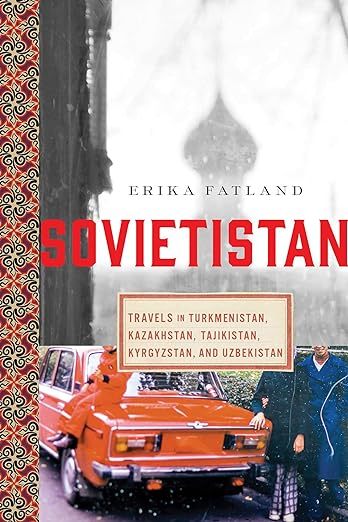
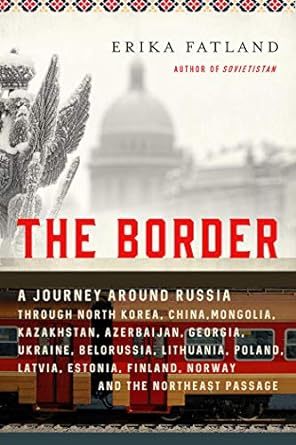
I've had these books sitting around for a couple of years now, but I finally picked up Erika Fatland's Sovietistan: Travels in Turkmenistan, Kazakhstan, Tajikistan, Kyrgyzstan, and Uzbekistan (BOOK | KINDLE | AUDIO) yesterday and I am burning through it and didn't even want to put it down long enough to post this. It's a good bet that any book that starts with a chapter about endlessly fascinating Turkmenistan and its crazy post-Soviet dictators -- the late, utterly ridiculous "Turkmenbashi" and the horse-obsessed dentist now in power -- is going to immediately capture my attention. The bizarre personality cults built around the dictators of Turkmenistan might actually be the one thing to shame Donald Trump because he'd be so envious of their audacity.
While I don't want my journey with Sovietistan to end as quickly as it's going to, I'm glad I also have Erika Fatland's book The Border: A Journey Around Russia Through North Korea, China, Mongolia, Kazakhstan, Azerbaijan, Georgia, Ukraine, Belarus, Lithuania, Poland, Latvia, Estonia, Finland, Norway, and the Northeast Passage (BOOK | KINDLE) ready to immediately dive into afterwards. I'm also going to need to get her newest book High: A Journey Across the Himalaya Through Pakistan, India, Bhutan, Nepal, and China (BOOK | KINDLE) to follow The Border. The author, Erika Fatland, is from Norway and speaks eight languages, so she's not completely lost in these wildly different and remote former Soviet satellite republics and her writing is vivid and funny (all three books are translated into English by Kari Dickson, so cheers to her, as well). I don't read a ton of books that fall in the genre of travel writing, but I might have to if there are more like this!
#Books#Book Recommendations#Book Suggestions#Erika Fatland#Sovietistan#The Border#High#Former Soviet Union#Soviet Union#Kazakhstan#Turkmenistan#Tajikistan#Kyrgyzstan#Uzbekistan#Travel Writing#Travel Writers#Former Soviet Republics#Turkmenbashi#Gurbanguly Berdimuhamedow#Saparmurat Niyazov#Dictators#Dictatorships#Personality Cults#Cults of Personality#Turkmen Dictators#Central Asia#History#Politics
40 notes
·
View notes
Text
So, apparently russia is seriously thinking of invading the Baltic states. It kinda makes sense in their twisty fetal-alcoholic-syndrome brains, as either country is smaller than the territory ruzzia gained in Ukraine.
“Estonia, Latvia, and Lithuania—and a discussion of which should be attacked first and how many troops it would take to do the job. The three former Soviet republics have been NATO members since 2004, but Putin and his allies don’t believe any Western powers would be willing to shed blood in their defense.”
Source:
But even without NATO, an attack on one Baltic state is an attack on all, as we all know that one of us will be next if the other is invaded. Besides, as a Lithuanian I'm kinda counting on our big sister Poland flexing their multi-billion-defence-budget muscles
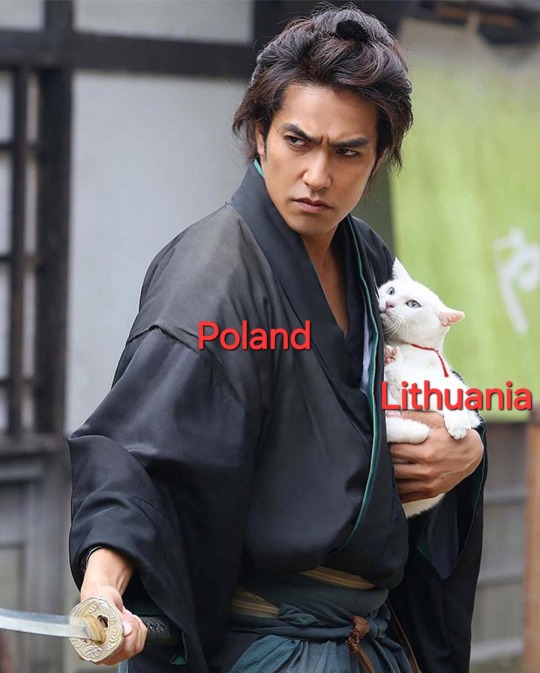
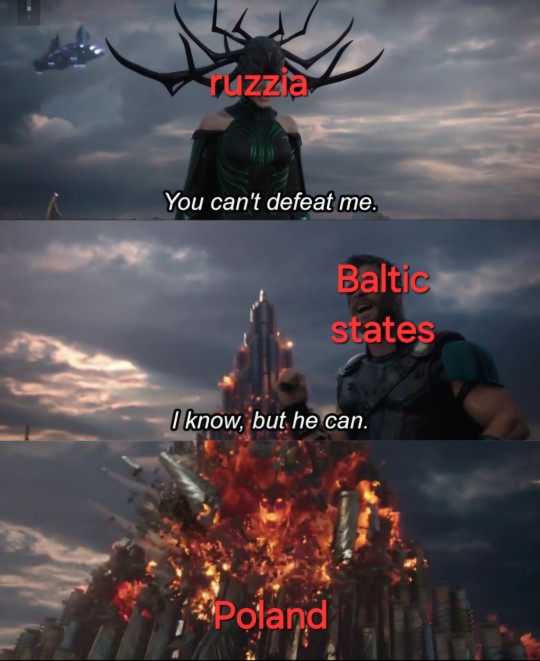
#russia#lithuania#baltic states#latvia#estonia#poland#russian imperialism#russia is a terrorist state
10 notes
·
View notes
Text
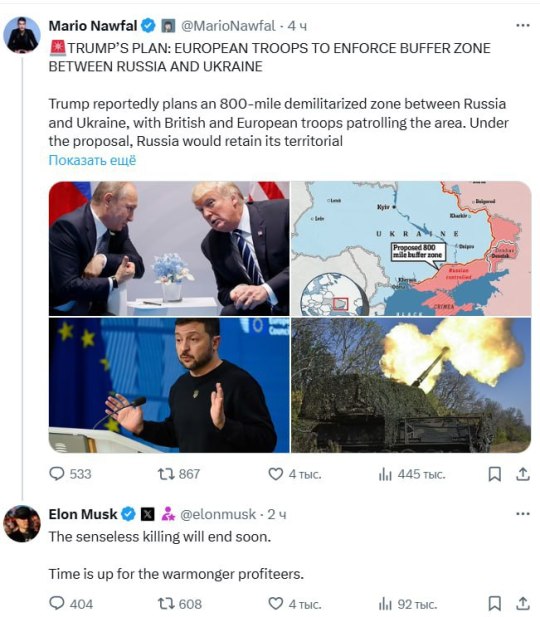
So the US will simply push the war onto Europe and continue to run everything from the shadows. If Europe defeats Russia, the US will be among the winners. If Europe loses, the US will have nothing to do with it. UK all the time will stay on side and pretends it’s just watching too.
Ukraine lost, and US want to have nothing to do with it already. Doesn’t mean that project Ukraine will be closed on the next day. Ukrainian Nazis will be Russian headache for a long time. The West found a nice tool and will continue to pick at this wound in Russia's side. The last time Soviet troops caught and liquidated Ukrainian Nazis till the 1950s when war was officially over in 1945. I would pay a lot to never hear anything about Ukraine and hohols for the next 20 years but doubt I will get such pleasure. Europe is nothing but another Ukraine. First, most likely, they will send to fight those about whom they don’t care. Eastern Europe and Scandinavians. Again, it doesn’t mean that it will happen tomorrow. All can be put on a pause to blow up after few years. The Ukraine project was in preparation for 8 years (Ukraine was actively pumping weapons and building a line of defense during Trump's first term. After dems came and lit a match.), and before that connections between nations were slowly destroyed for 30 years. Europe never had close ties with Russia, so here the process can go much faster.
As a potential start of the conflict: Finland, Estonia, Lithuania, Latvia and Denmark close to the Baltic Sea for Russian ships to Kaliningrad. At the same time, Poland moves its army to the borders of Kaliningrad, clearly threatening to seize the region, what will be popularly explained in the Russian information field (to start a hysteric in the Russian society like “Kaliningrad is in danger and Russian government is doing nothing!” like it was already once with Donbass theme), but there will be absolute silence in the Western information field (the same like with Donbass theme). When Russia is forced to react to the threat, the West press will begin their favorite "evil Russia has attacked independent countries again for absolutely no reason at all!" and then NATO propaganda will begin to agitate all of Europe for an open war with Russia. But this is just my fantasy based on what has already happened during the Russian history.
At the same time, the US will take care of China. They will drag this wise monkey from the mountain. (A wise monkey sitting on top of the mountain to watch the two tigers fight in the valley below. — Mao Zedong)
Meh. Dunno, will see. Anyway nothing good I'm waiting in the coming years.
youtube
“Propaganda. Propaganda never changes.”
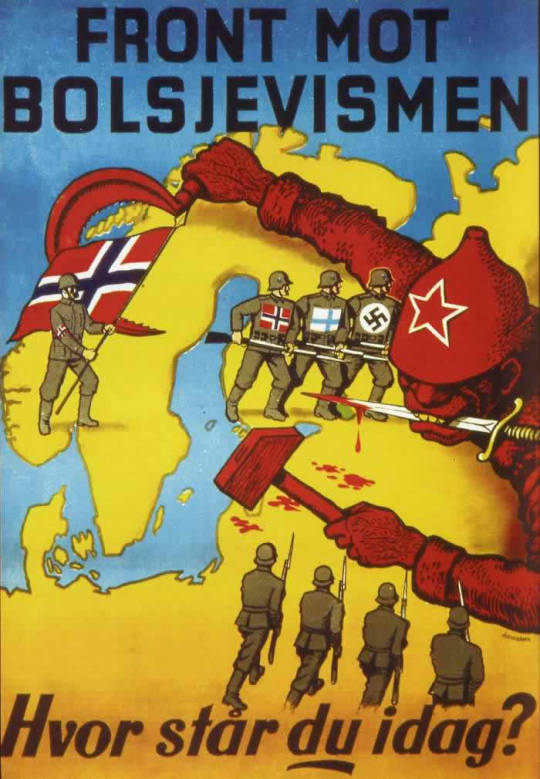
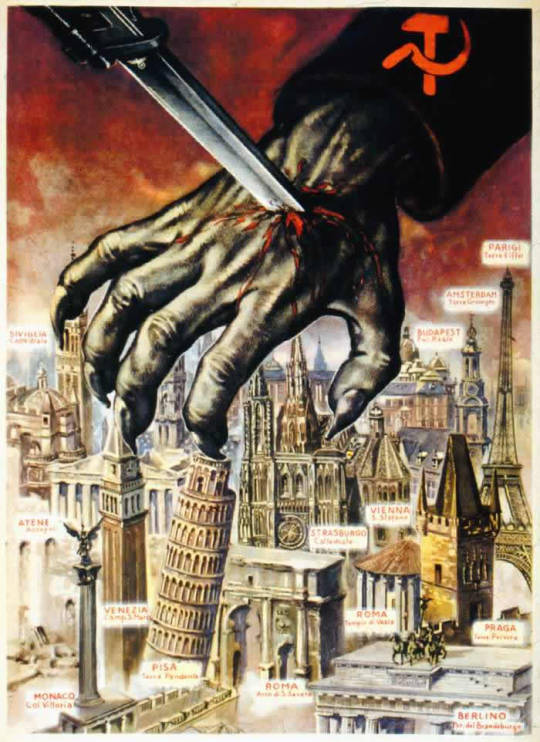
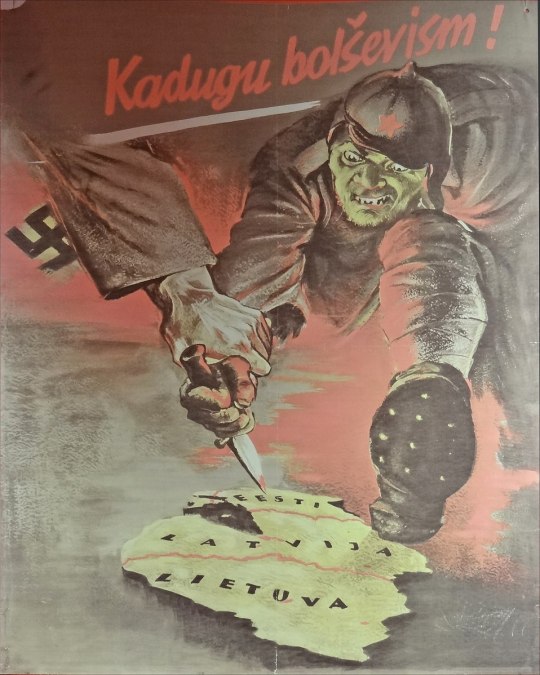
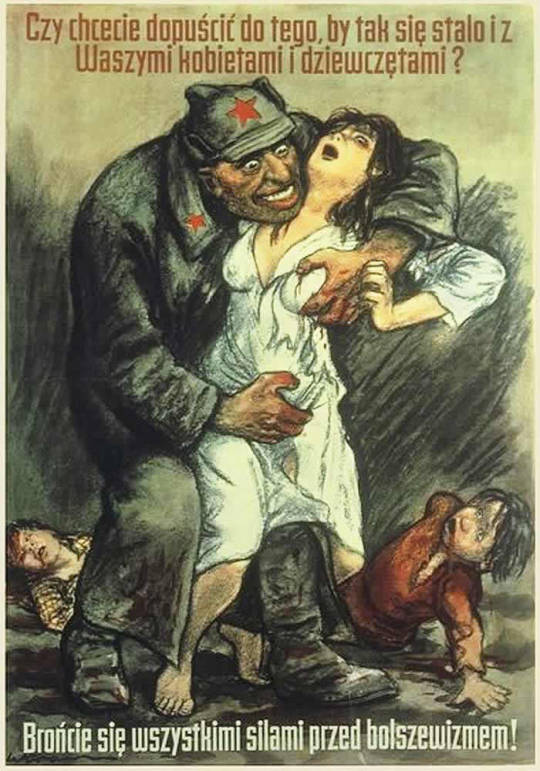
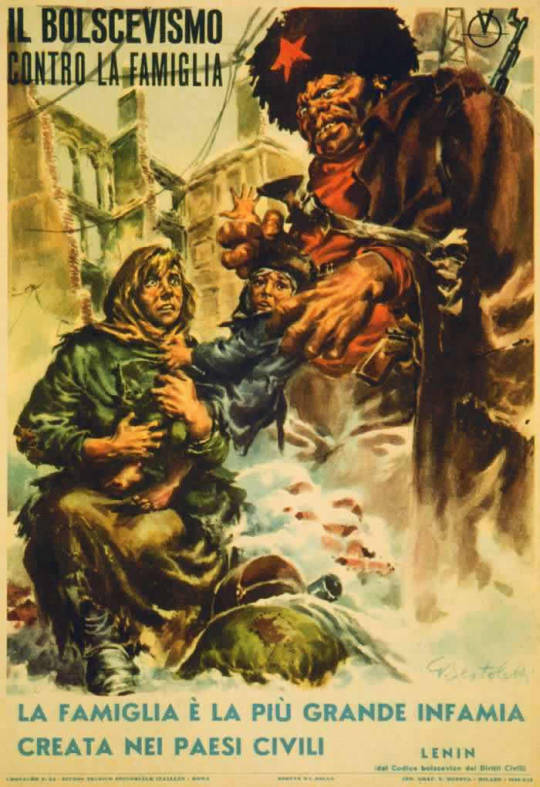
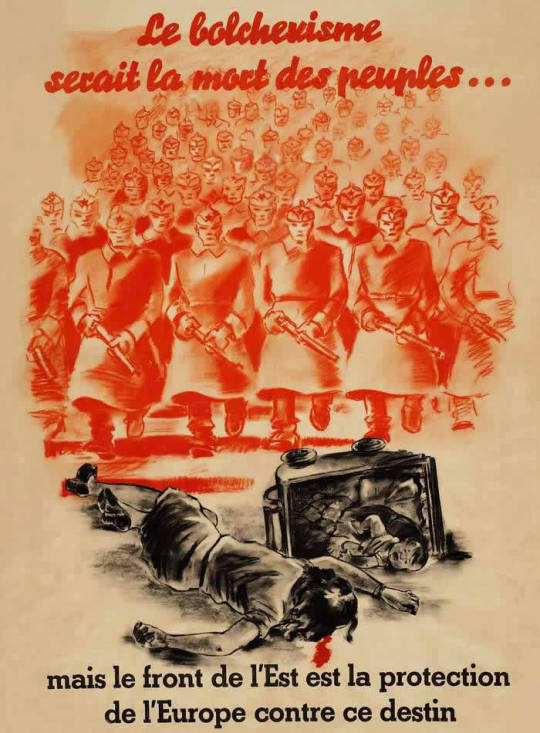
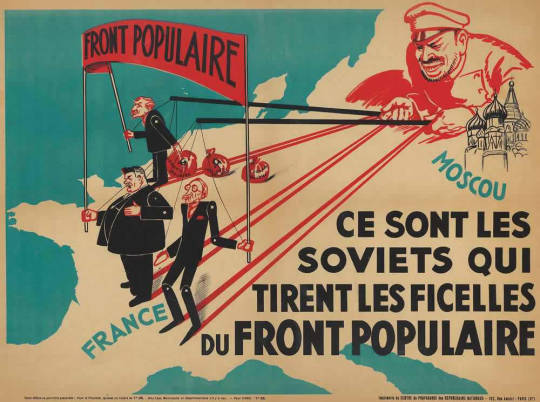
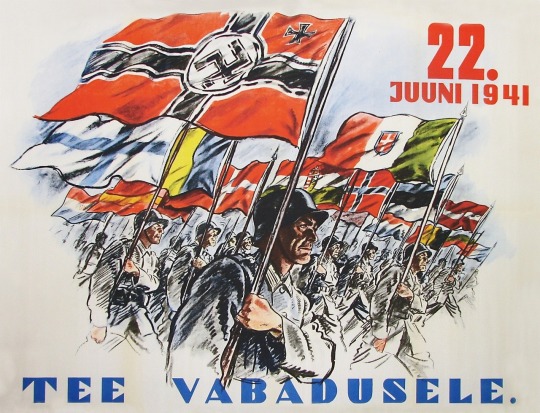
But at least in old times they drew better.
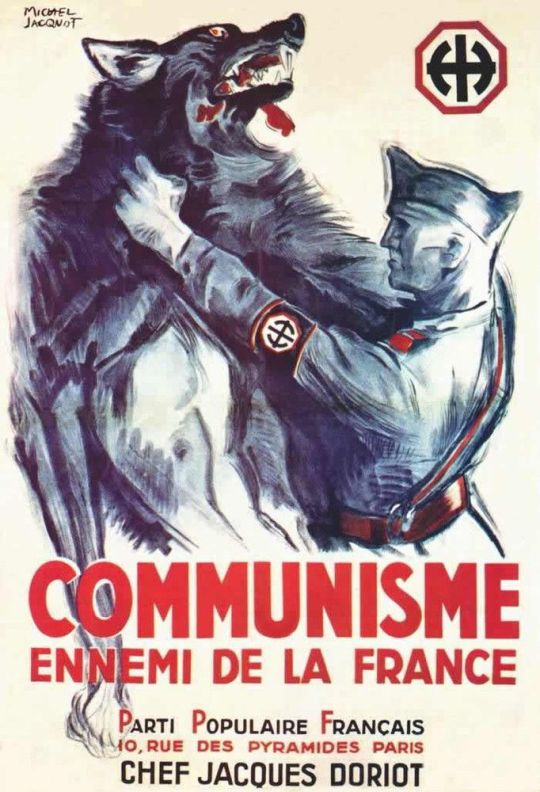
Hm. Cool werewolf.
5 notes
·
View notes
Text
"We were smuggled to Belarus." Migrants on the border with Finland told how they got there
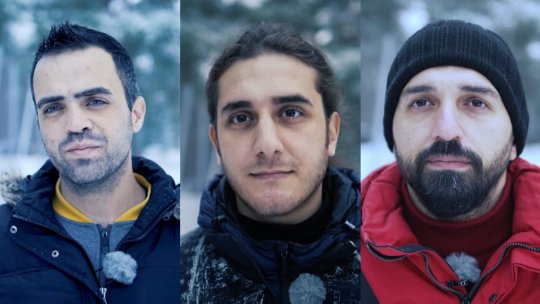
The Finnish publication Yle spoke to several illegal migrants who tried to enter the European Union from russia through Finland. They noted that due to the lack of success in the Belaruthian direction, many are now going from there to the Finnish border for luck.
Maayad Salami, Rayan Alhariri and Kamal Tawil are migrants from the Middle East who illegally crossed the russian-Finnish border a few days ago and then applied for asylum in Finland.
Syrian Maayad Salami said that recently in social networks "the opportunity to enter the European Union through Finland began to be actively advertised" and that is why he, together with five other migrants, came to St. Petersburg, from where a smuggler was supposed to take them to the Finnish border.
"The smuggler told us that the movement from St. Petersburg to the Finnish border was organized by the russian military. We were ordered two Yandex taxis for $100 and delivered closer to the border."
"There were some russian officers and investigators who were interrogating us. They canceled all our visas, took away all our passports, phones and money, and then after 7-8 hours of standing in the cold, they gave us bicycles to cross the border and forbade us to return to russia. They also said that if Finland completely closes the border, all migrants will be redirected to Norway, Estonia or Lithuania," Maayad Salami described his memories.
He added that now there are many migrants in russia who tried unsuccessfully to get from Belarus to Latvia, Lithuania or Poland. According to the Syrian, the topic was actively discussed in Telegram, Facebook and other social networks.
"There is now a huge amount of talk about which Finnish border posts are closed and which are still open," Salami said.
The same thing was confirmed by another Syrian, Ryan Alhariri, who tried unsuccessfully several times to get to Poland and Latvia through Belarus. He shared with Yle the details of his journey from Syria to Finland through Belarus.
"I left Syria and went to Beirut (Lebanon), from there I flew to Abu Dhabi (UAE), then to Moscow's Sheremetyevo airport. There we were smuggled to Belarus, where I unsuccessfully tried several times to get to Poland and Latvia.
"But then we saw in Telegram that the Finnish border is open for those migrants who are in Belarus. We and other migrants arrived in St. Petersburg, from where we were taken by taxi to the Finnish border, where russian soldiers took our phones, passports and money. In return, they gave us bicycles and told us to go to Finland," Alhariri described his journey.
Ryan Alhariri's journey from Syria to Finland through Lebanon, the UAE, russia, Belarus and again through russia. Photo: screenshot of a video by the Finnish publication Yle:
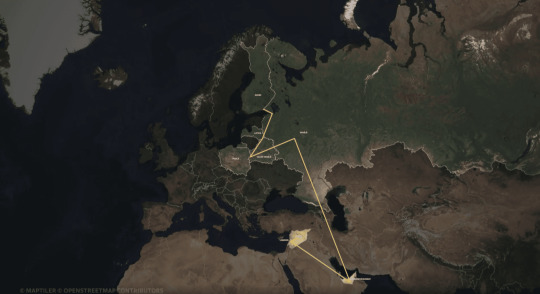
A third migrant, Kamal Tawil, also said that all his documents and phones were taken from him by the group at the border. But, according to Tavil, they were "detained for a very long time" by the russian military, and then the migrants were given bicycles and forbidden to return to russia.
We remind you that Finland has closed almost all border crossings on the border with russia, leaving only one in the north of the country. Migrants, including those with Belaruthian visas, are trying to get into the country .
Earlier, the border guard of Finland noted that large groups of 20-30 people with improved organization are trying to cross the border at the same time, they are better equipped than before, and they behave more confidently, which "resembles the crisis with Belarus."
(c)Naša Niva
17 notes
·
View notes
Text
Elitists backtalking me online
So context:
I posted a long while ago a picture of my main jacket to pinterest, and since then its gotten a decent amount of views... which also means a decent amount of hate comments from crusty elitists and metalheads. The amount had increased lately so I decided to reverse image search my post, incase someone had reposted it to a hate group or smth....
it was both worse and funnier.
My jacket got reposted to a russian facebook/twitter hybrid, Vkontakte.
where the account reposted my jacket in a compilation of a lot of jackets, and my jacket got flamed in the comments,
with people calling me a fat american and that my jacket is shit and I mustve just bought it off pinterest because Im a poser, and real punks are happy if they even find black pants from a dumpster.
Because I dont have bands on that one jacket and I have politics....
Calling me a fat privileged american is what rrly made me lose it because I SHARE A BORDER WITH RUSSIA, IM IN LATVIA, A QUITE UNDERPRIVILEGED COUNTRY THATS AT RISK FROM BEING INVADED
Im used to crustie hate comments because oh ma gahhh pinterest jacket, wheres the bands??? but oh lordy that was the worst of it shhshs
IStg if politics on a punk jacket is bad and posercore, well Ill be a poser then
Posting anything online brings haters, genuinely.
Reverse image search sucks tho it doesnt even bring back to my posts shdafjkh so a bunch of tumblr trojan virus copies, one persons repost, and vkontakte.
15 notes
·
View notes